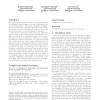Free Online Productivity Tools
i2Speak
i2Symbol
i2OCR
iTex2Img
iWeb2Print
iWeb2Shot
i2Type
iPdf2Split
iPdf2Merge
i2Bopomofo
i2Arabic
i2Style
i2Image
i2PDF
iLatex2Rtf
Sci2ools
148
click to vote
PODC
2009
ACM
2009
ACM
Load balancing without regret in the bulletin board model
We analyze the performance of protocols for load balancing in distributed systems based on no-regret algorithms from online learning theory. These protocols treat load balancing as a repeated game and apply algorithms whose average performance over time is guaranteed to match or exceed the average performance of the best strategy in hindsight. Our approach captures two major aspects of distributed systems. First, in our setting of atomic load balancing, every single process can have a significant impact on the performance and behavior of the system. Furthermore, although in distributed systems participants can query the current state of the system they cannot reliably predict the effect of their actions on it. We address this issue by considering load balancing games in the bulletin board model, where players can find out the delay on all machines, but do not have information on what their experienced delay would have been if they had selected another machine. We show that under these...
| Added | 25 Nov 2009 |
| Updated | 25 Nov 2009 |
| Type | Conference |
| Year | 2009 |
| Where | PODC |
| Authors | Éva Tardos, Georgios Piliouras, Robert D. Kleinberg |
Comments (0)

